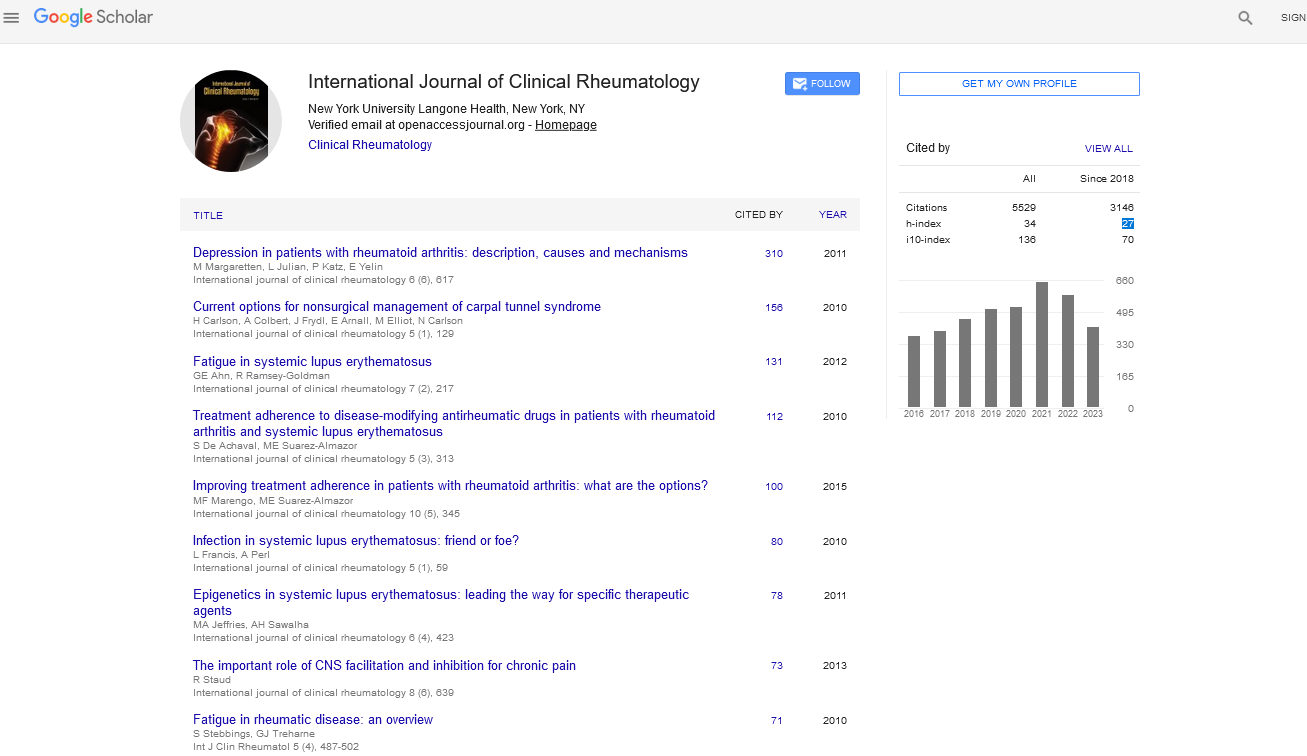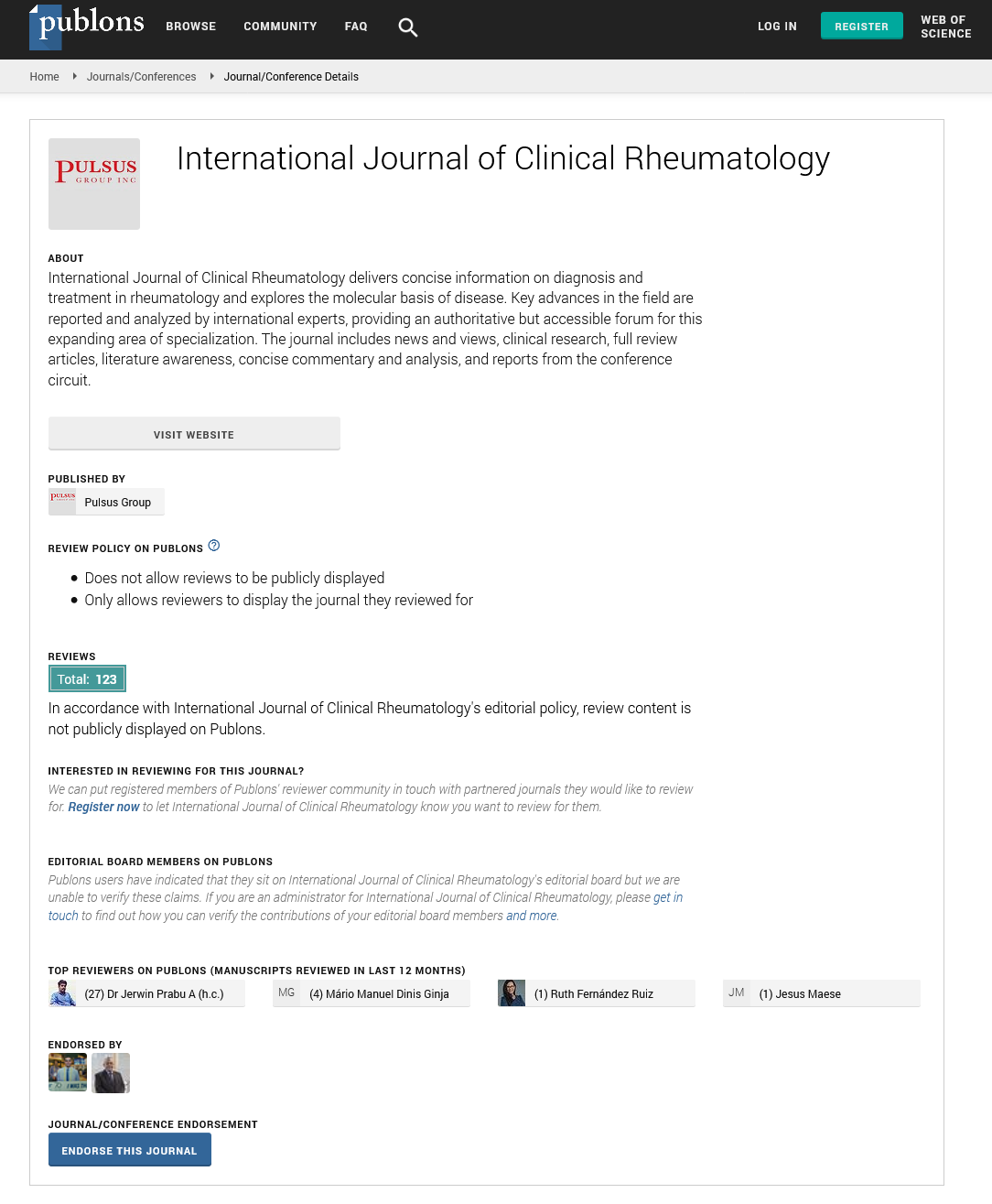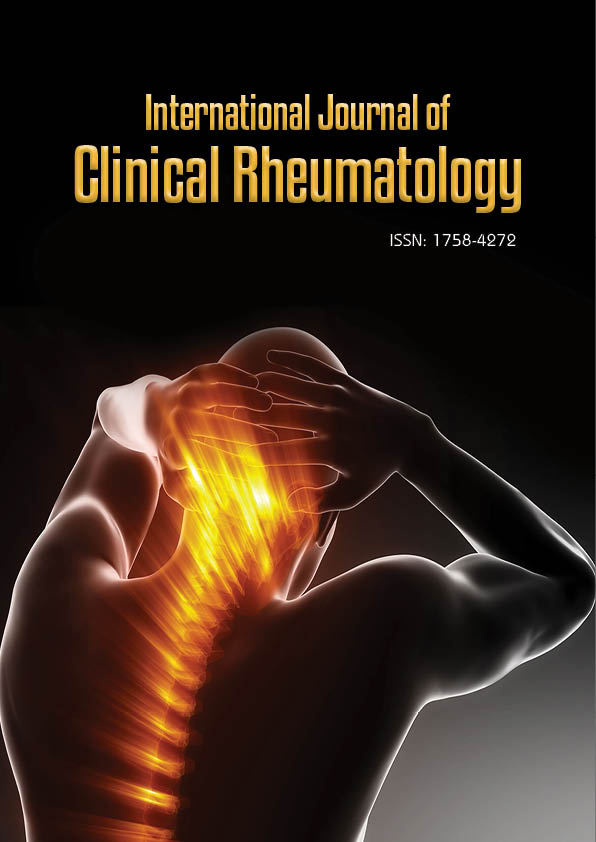Editorial - International Journal of Clinical Rheumatology (2022) Volume 17, Issue 12
Long-term effectualness of RA-1 as one medical aid and together with disease-modifying anti-rheumatic medication within the treatment of response condition
Avon Harold*
Department of rheumatology Malaysia
Received: 06-Dec-2022, Manuscript No. fmijcr-22-84106; Editor assigned: 09-Dec-2022, Pre-QC No. fmijcr-22-84106 (PQ); Reviewed: 20-Dec-2022, QC No. fmijcr-22-84106; Revised: 24-Dec-2022, Manuscript No. fmijcr-22-84106 (R); Published: 30-Dec-2022, DOI: 10.37532/1758-4272.2022.17(12).181- 184Abstract
Background: data on future use of Ayurvedic medication is skinny. They’ll prove useful if combined with stylish medication in certain clinical things (integrative medicine). We tend to tend to gift the results of Associate in Nursing extended term experimental study of RA-1 (Ayurvedic drug) used within the treatment of disease (RA).
Objective
The objective was to ascertain safety of future use of RA-1 for treatment of disease (RA).
Materials and Methods
On completion of a sixteen week irregular controlled study, 100 sixty 5 willing volunteer patients were registered into a three year open label section (OLP) study. Patients were symptomatic with persistent active unhealthiness and naïve for unhealthiness modifying anti-rheumatic medication (DMARD). Fifty seven patients were on fixed low dose medicine. Patients were examined every 10–14 weeks throughout a routine medicine follow victimization customary care norms. Throughout the study quantity and were generally urged to guide a healthy life vogue. Supported clinical judgment, specialist supplemental DMARD and/or steroids (modified if already in use) to patients with inadequate response; antiprotozoal drug and/or immunosuppressive drug usually used. Treatment response was assessed victimization yank faculty of medicine (ACR) effectiveness measures and ACR a pair of hundredth improvement index customary update maths computer code (SAS and SPSS) were used; vital at p < zero.05.
Conclusion
RA-1 is safe and effective at intervals the longer term management of symptomatic active chronic RA. DMARDs and/or steroids are also used judiciously beside RA-1 to treat hard disease/flares. Further studies unit of measurement required to guage RA-1 in early RA. This paves technique for analysis and application of integrative therapeutic approach in clinical medication.
Keywords
Rheumatoid arthritis • Treatment • Ayurveda • Ingredient drug • Integrative medication
Introduction
Ayurveda is associate ancient healthful system and is popularly practiced in Asian nation. The holistic treatment approach combines herb mineral formulations and life-style changes. Ancient classic texts unit of measurement necessary references [1]. Though in use for many years effectiveness at intervals the stylish context wishes validation. Plant based formulations unit of measurement hard to standardize. Several analysis publications have tried to unearth scientific proof of effectiveness of piece of writing derived medication to treat disease. Cochrane reviews embody a protocol on validation of Ayurvedic medication at intervals the treatment of RA [2]. We according the effectiveness and safety of RA-1, a fair Ayurvedic drug, at intervals the treatment of active symptomatic RA throughout a sixteen week irregular placebo controlled drug trial. Patients were naïve for unhealthiness modifying anti-rheumatic medication (DMARD). Ordinal patients were permissible to continued stable fixed daily low dose (< seven.5 mg daily) medicine. This maiden landmark study thespian attention towards the therapeutic potential of a fair Ayurvedic medication. Inspire of the advance at intervals the American faculty of medicine (ACR), a pair of hundredth response (primary effectiveness) wasn't statistically vital and RA-1 performed over the placebo in every effectualness variable with vital (p < zero.05) reduction in joint swelling and antibody titer. Impressed by the results, this study was undertaken as a three year open label section (OLP) study [3]. Though doctors in Asian nation sometimes combine Ayurvedic medicines and classy medicines in clinical follow, there is little or no scientific validation of this approach. It’s prudent to feature that to associate in Nursing large extent this kind of follow is surreptitious and unregulated. However, there is a growing enthusiasm for evidencebased integrative medication to treat hard disorders like RA. In the current OLP, associate integrative therapeutic strategy combining stylish medicines and Ayurvedic drug (RA-1) was accustomed treat patients with inadequate response [4]. The patient retention rate was over seventieth on study completion. We tend to tend to explain the effectiveness and safety of RA-1 at intervals the treatment of RA at intervals the present report.
Materials and techniques
Site
The study was distributed at the center for Rheumatic Diseases (CRD), Pune, at intervals the Western Asian nation State of region. CRD is also a community-based customary of care facility for rheumatic diseases [5].
Study vogue: This was a prospective experimental study of three years following a protocol driven irregular study. The OLP was guided by the overarching desires of a true to life clinical follow. Patients weren't lilywhite. Customary effectiveness measures urged by the ACR were used. Patients were examined at 12–16 weeks intervals for effectiveness and safety. All clinical services and RA-1 were provided free of worth to the patients. Patients were impressed to continue RA-1 throughout the study quantity. Any worsening of symptoms and flares or persistent inflammation (inadequate response to RA-1) was managed by rheumatologists as per medicine follow norms. Rheumatologist supplemental analgesics steroids and DMARD to a background medication [6]. All treatment decisions were created supported clinical judgment. The study vogue was approved by the CRD committee.
Discussion
This three year open label extension section study unarguable extended effectiveness and safety of RA-1 (Artrex™) at intervals the longer term management of patients filled with active chronic RA. RA-1 was accustomed treat RA effectively together agent (monotherapy) in regarding ordinal of the cohort. The remaining patients collectively to boot required steroids and or DMARD to manage RA. Steroids, albeit low dose, were used further frequently [7-8].
Steroids will be stopped in 100% patients on future use. RA-1 showed an outstanding safety profile. None of the patients ever required any specific intervention/ hospitalization or withdrew because of AE. We tend to tend to collectively unarguable a singular integrative strategy of blending stylish medication and Ayurvedic drug. A robust community base, good patient retention rate and consistency in drug use were necessary factors that contributed towards the success of the study. Patients with symptomatic, active and typical chronic unhealthiness were registered from the community. Sixty patients showed radio logically erosive unhealthiness. Patients were naïve for DMARD but several were maintained on fixed low dose of steroids before enrollment. Though improved considerably throughout the irregular section, several patients continued to suffer from symptomatic active unhealthiness [8]. We tend to tend to use a legitimate modified version of Stanford HAQ to capture the sensible incapacity. In our opinion, several of our life-style desires like sitting on the lowest impacts unhealthiness adversely and its activity (HAQ) is important towards the last word outcome with any treatment [9]. The Indian HAQ represents a bigger challenge for therapeutic success. Patients demand that their advantageous life-style be repaired and HAQ response at intervals the present study is also a sturdy rejoinder for the effectiveness of RA-1. Finally, we tend to tend to admit that we tend to tend to stand live late at intervals the day for business this report. The study was completed a few years past. We tend to tend to would love to substantiate to our readers that the delay wasn't because of any reason connected with the science or ethics of this study. There are many different hurdles and priorities. Also, data entry Associate in Nursingd analysis took an extended time. But we tend to tend to believe that the study has connectedness. We tend to tend to hope to inspire our colleagues to considerably explore ancient ethnic healthful system like piece of writing for higher future therapies. This is {often this can be} often collectively our inheritance [10].
Conclusion
To conclude, RA-1 (Aertex ™), a fair Ayurvedic ingredient formulation, could be a smart and safe DMARD at intervals the longer term management of RA. This study vindicates the results of the earlier irregular placebo controlled study. Patients with inadequate response and or persistent active unhealthiness despite RA-1 benefited from a thought-about concomitant use of steroids and DMARD. We tend to tend to powerfully advocate clinical Associate in Nursing alysis in integrative medication related to an initial specialize in chronic non-communicable diseases like RA.
Conflict of Interest
None
Acknowledgement
None
References
- Chopra A, Saluja M, Kianifard T et al. Long term effectiveness of RA-1 as a immunotherapy and in combination with disease modifying anti-rheumatic drugs in the treatment of rheumatoid arthritis. J Ayurveda Integr Med. 9, 201-208 (2018).
- Rosario NV, Ávila MA, Fred-Jiménez RM et al. Long-Term Outcomes in Puerto Ricans with Rheumatoid Arthritis (RA) Receiving Early Treatment with Disease-Modifying Anti-Rheumatic Drugs using the American College of Rheumatology Definition of Early RA. Open Rheumatol J. 11, 136-144 (2017).
- Hamdulay SS, Mason JC. Disease-modifying anti-rheumatic drugs: do they reduce cardiac complications of RA. Heart. 95, 1471-1472 (2009).
- Turkstra E, Ng SK, Scuffham PA. A mixed treatment comparison of the short-term efficacy of biologic disease modifying anti-rheumatic drugs in established rheumatoid arthritis. Curr Med Res. 27, 1885-1897 (2011).
- Sokka T, Möttönen T, Hannonen P. Disease-modifying anti-rheumatic drug use according to the `sawtooth' treatment strategy improves the functional outcome in rheumatoid arthritis: results of a long-term follow-up study with review of the literature. Rheumatology. 39, 34-42 (2000).
- Montag K, Gingold M, Boers A et al. Disease-modifying anti-rheumatic drug usage, prescribing patterns and disease activity in rheumatoid arthritis patients in community-based practice. Intern Med J. 41, 450-455 (2011).
- Jurgens MS, Jacobs JWG, Bijlsma JWJ. The use of conventional disease-modifying anti-rheumatic drugs in established RA. Clin Rheumatol. 25, 523-533 (2011).
- Wong M, Mulherin D. The influence of medication beliefs and other psychosocial factors on early discontinuation of disease-modifying anti-rheumatic drugs. Musculoskelet Care. 5, 148-159 (2007).
- Morgan CL, Emery P, Porter D et al. Treatment of rheumatoid arthritis with Etanercept with reference to disease-modifying anti-rheumatic drugs: long-term safety and survival using prospective, observational data. Rheumatology. 53, 186-194 (2014).
- Farragher TM, Lunt M, Fu B et al. Early treatment with, and time receiving, first disease-modifying ant rheumatic drug predicts long-term function in patients with inflammatory polyarthritis. Ann Rheum Dis. 69, 689-695 (2010).
Indexed at, Google Scholar, Crossref
Indexed at, Google Scholar, Crossref
Indexed at, Google Scholar, Crossref
Indexed at, Google Scholar, Crossref
Indexed at, Google Scholar, Crossref
Indexed at, Google Scholar, Crossref
Indexed at, Google Scholar, Crossref
Indexed at, Google Scholar, Crossref


